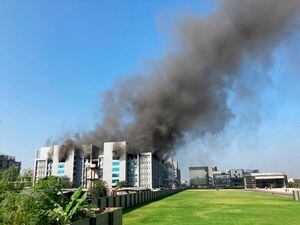Fire hits building at world’s largest vaccine maker in India
The company said the fire in Pune did not affect existing facilities making Covid-19 vaccines or a stockpile of around 50 million doses.

A fire has broken out at a building under construction at the Serum Institute of India, the world’s largest vaccine manufacturer, possibly affecting its future expansion of Covid-19 vaccine production.
Firefighters were extinguishing the flames, the fire office in Pune city in southern Maharashtra state said.
The cause of the fire and extent of the damage were not immediately clear.
“We have rescued three people and there are no casualties,” said fire official Prashant Ranpise, who was supervising rescue operations.

It said the fire did not affect existing facilities making Covid-19 vaccines or a stockpile of around 50 million doses.
“So far the most important thing is that there have been no lives lost or major injuries due to the fire, despite a few floors being destroyed,” company chief executive Adar Poonawalla said.
Images showed huge plumes of smoke billowing from the building as firefighters worked to extinguish the blaze.
The Serum Institute of India is the world’s largest maker of vaccines and has been contracted to manufacture a billion doses of the AstraZeneca/Oxford University vaccine.
Mr Poonawalla said in an interview with the Associated Press last month that it hopes to increase production capacity from 1.5 billion doses to 2.5 billion doses per year by the end of 2021.
The new facility is key to the expansion.
Of the more than 12 billion coronavirus vaccine doses expected to be produced this year, rich countries have already bought about nine billion, and many have options to buy even more.
As a result, the Serum Institute is likely to make most of the vaccines that will be used by developing nations.





